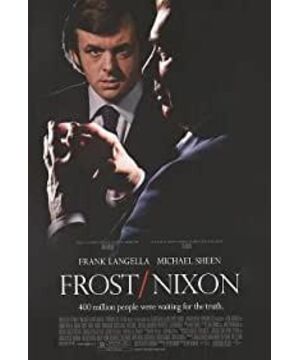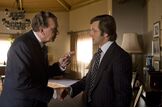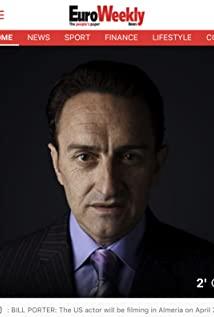As long as you know a little about the background of the film, understanding is no problem. Ron Howard, who has always been good at storytelling, tried his best to achieve a smooth narrative through documentaries, interviews with actors playing roles, etc. to achieve a smooth narrative. This is a form of advancement, but it is more to explain the plot to the audience, but there are no lines of great value in it, and it is even more fake if it is fake (it is said that Xiao Jia's "24 City (2008)" will also use Such a form, I haven't seen it yet), and even some emotional changes that can be fully expressed by actors and cameras are explained by another person's narration, which is a bit underestimating the audience's IQ to be honest.
On the other hand, the script provides a lot of related character performances of the two protagonists, so as to make the film more inclined to dig into the characters and not be too boring because of politics. It is undeniable that the best part of the film only appeared in a few interviews. This may be the most difficult segment to express due to the most ambiguous and ambiguous contradictions of the characters controlled by the director. That kind of character seems to be advancing and retreating very well.
It's just that the rest is Hollywood's habit of simplicity, as if Foster was portrayed as a talk show host who made himself into a moral defender by thinking overnight, and Nixon collapsed from a conceited guy in an instant. Frank Langella should be the hero who propped up the film. The character's performance is very relaxed, and the close-up face is always full of drama. Although Michael Sheen is also the original cast member of the stage play, he feels the same as him. The time of playing Blair is about the same, and the trace of acting is a little heavy. All the other supporting roles are also masked and skinned, and the overall feel is still as idealistic and whitewashed as Ron Howard's usual movies. That historic conversation will obviously touch a lot of people, especially Americans, including "Oscar," but it doesn't mean much to us. And the little thought at the end of the film is not too late, or it is not enough to reverse the mediocrity in front of the whole film. Far.
Just like the CCTV Qing Palace drama that was metaphorically mentioned before, with refined packaging and popular expression, let as many people watch it as possible, sigh the joy of fighting with others, and then return to real life to paralyze yourself again.
2008-12-15
View more about Frost/Nixon reviews











